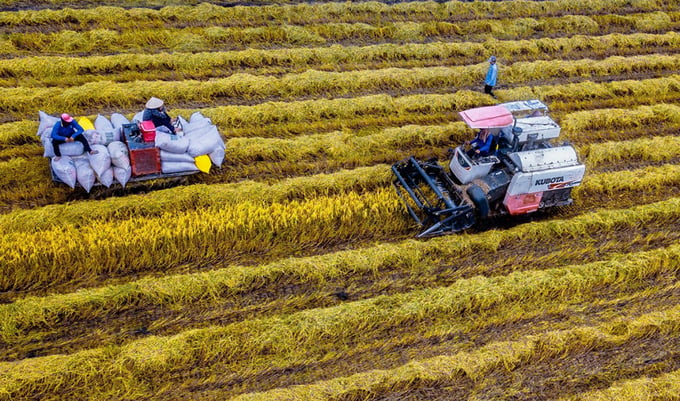June 21, 2025 | 02:32 GMT +7
June 21, 2025 | 02:32 GMT +7
Hotline: 0913.378.918
June 21, 2025 | 02:32 GMT +7
Hotline: 0913.378.918

Harvesting rice crop in Hau Giang province. Photo: An Binh
This content was just raised by the Agricultural Project Management Board when working with the Ministry of Agriculture and Rural Development in Can Tho on April 8.
The Ministry evaluates the sustainable development project of one million hectares specializing in high-quality rice cultivation as essential and urgent, requiring a specific mechanism. Therefore, this agency plans to request the Government to allow the construction of a project to borrow money from the World Bank according to a particular mechanism. The central budget allocates 100% of ODA capital (an on-lending mechanism is not applied).
The total project investment is expected to be more than USD 470 million (equivalent to nearly VND 11,800 billion). Of which, the World Bank loan is about USD 360 million (equivalent to VND 9,000 billion); Domestic counterpart capital is more than USD 112 million. With nearly 1 million hectares of rice, each investment ranges from USD 325 to USD 794 per hectare.
Senior Agriculture Economist in the South Asia Region of the World Bank Li Guo said he would submit the project to leaders based on the sustainable agricultural transformation project in Vietnam (VnSAT), but more expanded.
"We hope that Vietnam will be a pioneer in reducing emissions in agricultural production worldwide. We will coordinate closely with the Ministry to take the next steps," said the World Bank's Economist.
Project for Sustainable Development of one million hectares specializing in high-quality and low-emission rice cultivation associated with green growth in the Mekong Delta until 2030, approved by the Prime Minister at the end of 2023. The project aims for the sustainability of Vietnam's rice industry and farmers' income, adapt to climate change, reduce greenhouse emissions, and contribute to implementing international commitments.
By 2025, 12 provinces and cities in the Mekong Delta will grow 180,000 hectares of low-emission rice and pilot carbon credits for areas that meet standards. By 2030, the region will expand to 820,000 hectares of low-carbon rice...
Currently, each year, the provinces in the West produce 24-25 million tons of rice, accounting for more than 50% of rice output and over 90% of the country's rice exports.
Translated by Huong Giang
/2025/06/17/3942-2-143243_548.jpg)
(VAN) Recently, in Sweden, the Secretary of the Binh Dinh Provincial Party Committee presented the Investment Registration Certificate for the 'Polyester Fabric Recycling Complex' project to SYRE Impact-AB Company.
/2025/06/12/3721-2-202745_83.jpg)
(VAN) TH made an impression at Seoul Food 2025 with its line of natural beverages, paving the way for Vietnamese food products to enter the South Korean market.

(VAN) Soc Trang's success in rice exports stems from a strategy of developing fragrant and specialty rice cultivation areas and standardizing production toward low-emission practices.
/2025/06/11/1311-5-120811_839.jpg)
(VAN) The pig farming industry is facing the challenge of comprehensive restructuring to meet requirements for quality, safety, traceability, and market expansion both domestically and for export.

(VAN) Vietnam considers participating in ALGROALBA in order to expand agricultural production, coordinate the assessment and effective exploitation potential land.
/2025/06/05/5314-1-184727_407.jpg)
(VAN) From seemingly worthless fish scales and skin, enzymes and lactic ferments can transform by-products into peptides, opening a sustainable, effective business direction and elevating Vietnamese seafood.

(VAN) TTC AgriS and IFC signed a strategic partnership to develop a sustainable agricultural value chain, aiming to achieve the Net Zero target by 2035.